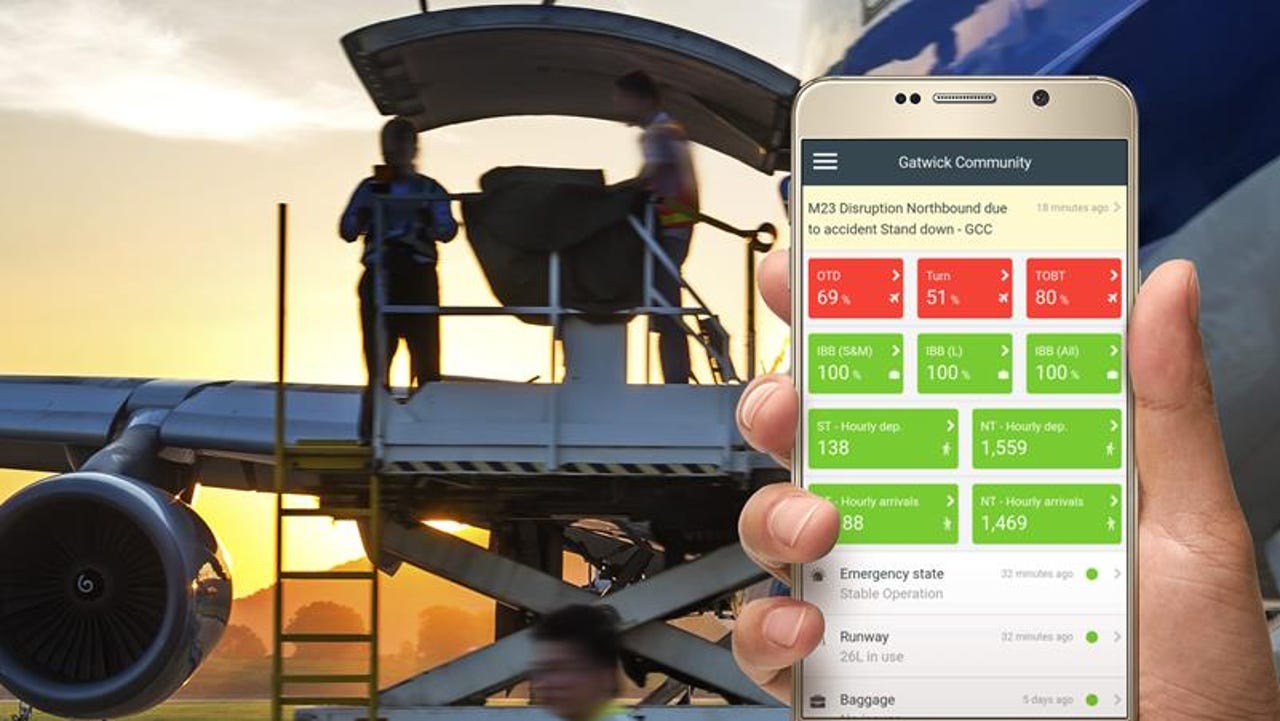Gatwick's airport app is taking off... and should inspire others to follow its example


Gatwick airport's smartphone app is taking off not just at Gatwick but at other airports -- and it looks like the sort of thing many other disparate communities need. It provides important information to thousands of people who work for hundreds of different companies on the same campus, but who were previously restricted to their own limited view of the airport's operations. But, for obvious reasons, it's not available to passengers.
Modern airports operate like miniature cities with most people working for different employers. The obvious groups include air traffic controllers, airline staff, baggage handlers, fire services, and security staff, including immigration control officers and the police. Many others provide catering and cleaning services, shops, hotels, car parking, and transport connections. Gatwick, for example, has a mainline railway station, 24-hour bus services and a National Express coach depot.
Only about 10 percent of Gatwick's workers are actually employed by the airport, but they are all affected by the number of planes landing and taking off, and by the number of passengers arriving and departing by road and rail. Staff have extra problems when there are glitches. For example, delayed or cancelled flights may need extra food services, extra hotel beds, and extra police to control queues.
The dashboard shows urgent messages and traffic flows at the North and South Terminals (NT and ST).
Until recently, Gatwick's workers had no way of knowing what was happening in the rest of the airport. Now they can find out from the dashboard of a smartphone app that runs on Apple iOS and Android devices. They can also drill down to find more detailed information about particular services. Managers can display the information on large desktop PC screens.
Of course, there are drawbacks. For example, if an airline is having a bad day, rivals can see their turnaround times and how their percentage scores compare with everybody else's. But users such as EasyJet and Menzies Aviation say this stimulates competition. And if everybody tries harder, passengers get a better service.
Abhi Chacko, Gatwick's head of IT Commercial and Innovation, had the idea for the app after a passenger asked him a question he couldn't answer. "Well, don't you work here?" the passenger replied. Chacko was embarrassed, but smart enough to realize that an Airport Community app could give thousands of staff the ability to answer questions very easily.
Gatwick Airport decided not to write the app in house. After talking to the airport's suppliers, they knew they needed a multi-airport app: many of Gatwick's service providers operate across dozens of airports. So they partnered with AirportLabs -- a supplier of FIDS (Flight Information Display Software) eg for passenger check-ins -- to develop one. It's a UK-based company with developers in Romania.
With the app working successfully at Gatwick, AirportLabs was able to approach other airports with the same needs, though perhaps with different data feeds. Gatwick says it launched the app early last year, and it has already been rolled out at several other airports, including Edinburgh, Bristol, and Milan.
The app shows staff much more detailed information about a plane's arrival and subsequent departure than simple 'gate closes' and take-off times.
Ligiu Uiorean, director of AirportLabs, says the app is being run at about 10 airports so far, with trials at another five stretching from Europe to the Far East. Some airlines are using the app for their own staff and suppliers at about 140 airports. This is possible because the app -- like the whole aviation industry -- runs on "Zulu time", the time at the Zero Meridian. This is better known as GMT (Greenwich Mean Time) or, now, UTC (Coordinated Universal Time).
The app is being improved and expanded in response to user suggestions, so Gatwick is benefiting from developments at other airports. For example, Edinburgh "introduced additional functionality such as fault reporting and real-time security queue times," according to the airport's IT director David Gammie.
Gatwick's Community app has just been shortlisted for several awards in the UK, including three categories in the Lloyds Bank National Business Awards and four in the Digital Impact Awards.
Interestingly, nobody is forced to use the app: It's a free download for whoever wants it on their personal device. (You need a suitable email address or a token from AirportLabs to make it work.) Chacko says Gatwick has around 10,000 users so far.
The app looks worth installing just for the phone directory/contacts list. However, it also has channels for urgent information such as operational messages, runways, cancellations and weather. These have largely replaced the previous system, which involved sending thousands of SMS text messages.
There must be many other "mini-cities" that could benefit from a similar community app. University campuses, shopping malls and technology parks are obvious examples. Earlier this month, AirportLabs released Port Community, an app for the shipping industry.
Note: Most of the quotations in this report have been taken from Gatwick Airport's 17-minute video, The Airport Community App story.
PREVIOUS AND RELATED COVERAGE
The British government will publish a "statement of intent" to strengthen data protection laws, giving people the right to have their personal data deleted. Organizations that can't or won't delete data, or fail to report security breaches, can be fined up to £17 million or up to 4 percent of their global turnover.
First look: the Fitbit Charge 2 is a wearable fitness band with a great smartphone app
Fitbit's Charge 2 is a decent replacement for a Microsoft Band 2. The device's user interface is nothing like as good, but the far superior smartphone app more than makes up for it.
BT warns Ofcom against disincentivising its investments in ultrafast broadband
Coverage of BT's latest quarterly financial results was dominated by an Italian accounting scandal that hit profits. The plan to offer ultrafast broadband to 12m users by 2020 - Ofcom willing - is more important, but still not enough.